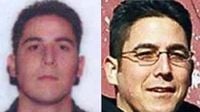For more than two decades, the FBI’s “Most Wanted” list has been a symbol of both notoriety and the relentless pursuit of justice. Now, in a dramatic twist, one of its most elusive fugitives, Daniel Andreas San Diego, has been apprehended after vanishing for over 20 years following a pair of bombings in California. As the world’s attention turns to London, where San Diego faces extradition to the United States, the saga of the FBI’s most wanted—and the evolving nature of high-profile fugitives—offers a riveting look at crime, punishment, and the dogged persistence of law enforcement across continents.
San Diego, now 47, was accused of planting two sophisticated bombs in the San Francisco Bay Area in 2003. According to the BBC, these attacks targeted biotech and nutritional firms in Emeryville and Pleasanton, California, on August 28 and September 26, respectively. Miraculously, no casualties were reported, but the calculated nature of the bombings sent shockwaves through the community and raised alarms about the potential for escalating violence. The FBI later revealed that one device was designed specifically to target first responders, detonating after an initial blast—a chilling detail that underscored the threat posed by the perpetrator.
In the aftermath, San Diego became the first American-born suspect to be placed on the FBI’s Most Wanted Terrorists list, with a $250,000 bounty set for his capture. The FBI’s decision to include him on this notorious roster was not made lightly. As outlined by the agency, the list is reserved for fugitives accused of the most serious federal crimes—terrorism, violent acts, and major fraud—who are believed to pose a significant threat to society. Only ten names can appear at any given time, and inclusion is determined at FBI headquarters in Washington, D.C., after careful consideration of the case’s gravity and the potential for public assistance in apprehension.
San Diego’s story is one of both cunning and missed opportunities. As recounted by former FBI surveillance experts David Smith and Clyde Foreman, the agency had identified San Diego as their prime suspect in 2003 but opted to delay his arrest in hopes of gathering intelligence on possible accomplices. "He was remarkable by being unremarkable," Smith told the BBC. "Nothing suggested he was about to turn violent." But as the investigation dragged on, San Diego slipped away—literally. During a frantic 65-mile rush-hour chase through California, he weaved through commuters and toll bridges before abandoning his car in downtown San Francisco, its engine still running near a subway station. Heavy fog provided cover, and by the time agents reached the vehicle, San Diego had vanished.
What the FBI found inside the abandoned car only deepened the mystery. Investigators discovered what they described as a suspected "bomb-making lab" in the trunk. Smith recalled, "It was everything you ever wanted. Had we known that, he’d have been arrested days earlier." The sophistication of the devices and the evidence left behind suggested a methodical approach, fueling fears that San Diego might strike again—or inspire others to do so.
By 2004, the FBI had indicted San Diego on charges of maliciously damaging and destroying property with explosives. They considered him armed and dangerous, but leads quickly dried up. Agents monitored his family and friends, suspecting he might have fled to Central or South America, but the trail went cold. For years, San Diego’s whereabouts remained a mystery, his case becoming one of the agency’s most frustrating and high-profile manhunts.
The hunt for San Diego took an unexpected turn in November 2024, when UK authorities, in collaboration with the National Crime Agency and counter-terror police, raided a remote cottage in the Conwy valley of north Wales. There, they found San Diego living under the alias Danny Webb, blending into the rural community and evading detection. According to BBC reporting, he had been living quietly, his past all but forgotten—until his arrest reignited international interest in the case.
San Diego is now set to appear at Westminster Magistrates’ Court in London for a five-day extradition hearing beginning Monday, September 8, 2025. Prosecutors allege that he acted as part of the animal rights extremist group Revolutionary Cells, targeting companies linked to animal testing. For the FBI, his reappearance offers a rare second chance at justice. "It was definitely a missed opportunity," Smith admitted. "But now there’s a chance for justice." Foreman, meanwhile, suspects San Diego had outside help evading authorities for so long: "He was not a skilled intelligence officer. He had to have support."
The FBI’s Most Wanted list has evolved over time, reflecting changing threats and the public’s role in aiding law enforcement. While the agency sets the bounty in consultation with the Department of Justice, rewards can range from thousands to millions of dollars, depending on the risk and profile of the case. The $250,000 bounty for San Diego underscored the seriousness of the 2003 bombings and the urgency of his capture.
San Diego’s case is not the only one drawing global headlines. As of 2025, the FBI’s “10 Most Wanted” list includes two women, according to The Economic Times. Cindy Rodriguez Singh, who was added to the list in 2023 for capital murder and unlawful flight, was arrested earlier this year in India after fleeing the US in March 2023. The other woman, Ruja Ignatova, was placed on the list in June 2022 for her alleged leadership of a massive fraud scheme that defrauded billions of dollars from investors worldwide. Ignatova, born in Bulgaria and founder of OneCoin Ltd., is accused of orchestrating one of the largest cryptocurrency scams in history, affecting victims across the globe.
These cases highlight the breadth of crimes represented on the FBI’s list—from violent acts and terrorism to sophisticated financial fraud. They also underscore the international dimension of modern law enforcement, where fugitives can disappear across borders but rarely escape the long reach of justice. FBI Director Kash Patel praised the "tremendous field work, law enforcement partners, and intelligence operatives" who contributed to Singh’s arrest, reflecting the collaborative nature of such investigations in today’s interconnected world.
The re-emergence of Daniel Andreas San Diego, after years spent living under an assumed identity in the Welsh countryside, is a testament to both the ingenuity of fugitives and the perseverance of those who pursue them. For the FBI, the case is a reminder that even the most elusive suspects can eventually be found—and that the pursuit of justice, no matter how long delayed, is never truly over.


